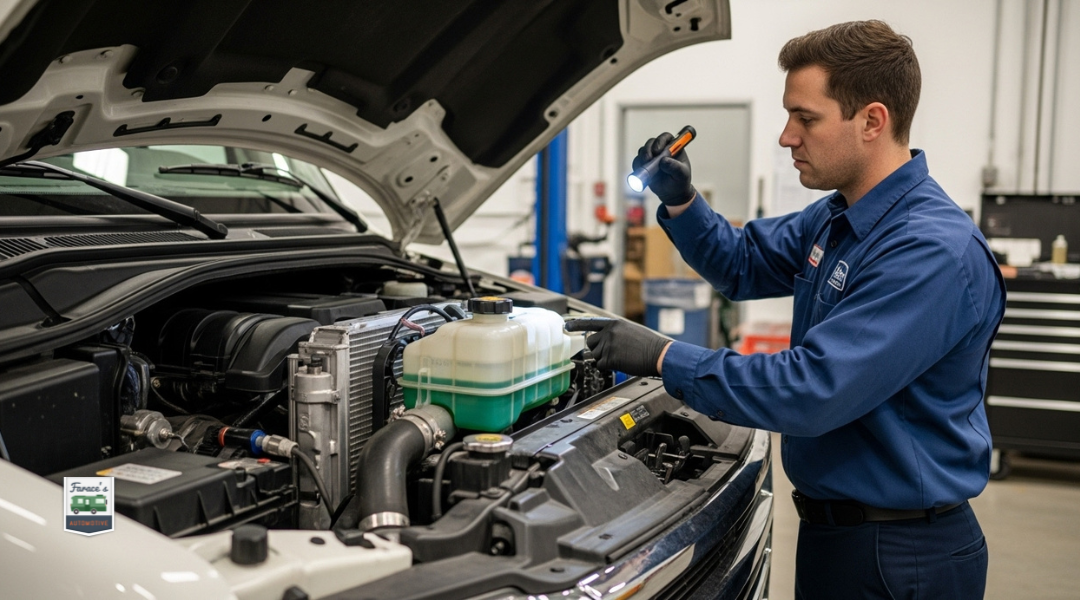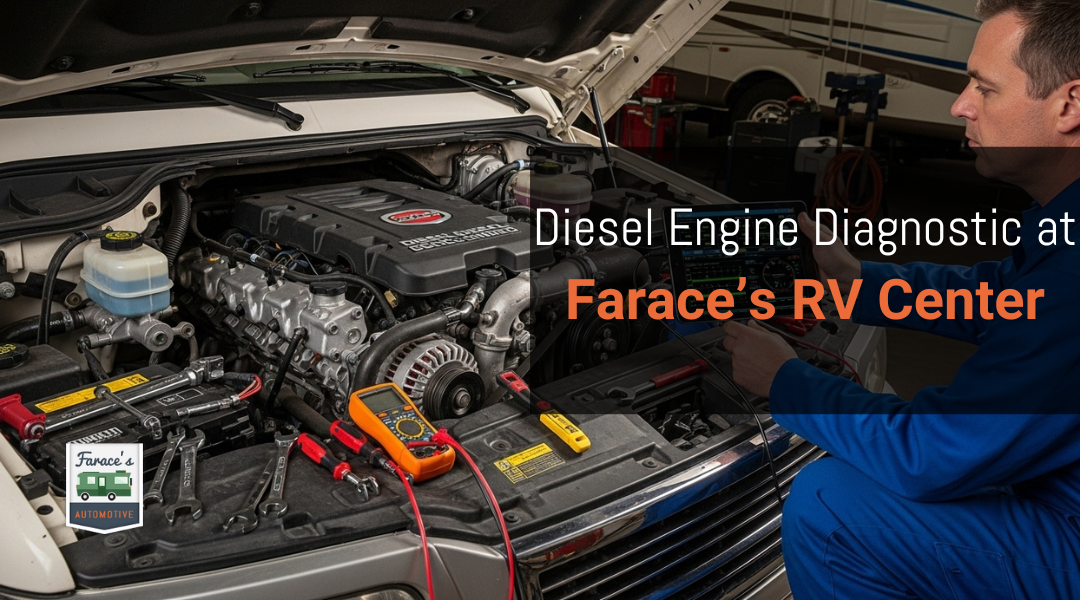When your RV’s diesel engine starts showing signs of trouble, a diagnostic test gives you clear answers instead of guesswork. During a diesel engine diagnostic at Farace’s RV Center, trained technicians use advanced equipment to pinpoint issues in your engine, fuel system, and related components so you know exactly what needs attention. This process saves time, prevents unnecessary repairs, and helps keep your motorhome running reliably on the road.
At Farace’s, you don’t just get a quick scan—you get a thorough evaluation backed by decades of experience in diesel service. The team checks essential systems like the engine, transmission, and electrical components to identify hidden issues that could affect performance or safety. You can expect detailed feedback and recommendations designed to keep your RV operating at its best.
By understanding what happens during a diagnostic, you can approach maintenance with confidence and avoid costly surprises. Farace’s combines modern diagnostic tools with hands-on expertise, giving you both accuracy and trusted service every time you bring in your diesel motorhome or truck.
Why Diesel Engine Diagnostics Are Essential For RV Owners
Diesel-powered RVs deliver strength and efficiency, but their systems require precise care to remain reliable. Regular diagnostics help you detect issues early, reduce downtime, and keep your motor home safe and efficient on long trips.
The Complexity Of Diesel Vs. Gas Engines
Diesel engines in motor homes differ significantly from gasoline engines. They use high-pressure fuel injection, turbochargers, and advanced emissions systems such as EGR and DPF. These components operate under tighter tolerances, making accurate diagnostics critical.
Unlike gas engines, a diesel relies on compression ignition rather than spark plugs. This means problems with fuel delivery, injectors, or cylinder compression can quickly affect performance. A small fault may cause symptoms like reduced power, excessive smoke, or difficulty starting.
Modern diesel RVs also include electronic control units (ECUs) that store trouble codes when sensors detect irregularities. Without diagnostic scanning tools, it’s nearly impossible to trace the exact cause of a warning light or drivability issue.
Because of this complexity, regular diagnostics give you clarity instead of guesswork. They ensure that both electronic and mechanical systems are evaluated together, which is especially important for heavy, long-haul vehicles like motor homes.
Preventing Costly Breakdowns On The Road
When you travel in a motor home, a breakdown is more than an inconvenience—it can disrupt your trip and lead to expensive repairs. Many failures, such as a clogged fuel filter or failing injector, show early warning signs that diagnostics can detect before they escalate.
A systematic check includes:
- Visual inspection for leaks, worn belts, or damaged hoses
- Computerized scanning for error codes and sensor readings
- Component testing such as fuel pressure and turbocharger function
Catching these problems early helps you avoid being stranded or facing emergency roadside service. It also reduces the risk of secondary damage, like overheating from a neglected cooling system or engine wear from poor fuel delivery.
By scheduling diagnostics at set intervals, you keep your RV running efficiently, maintain fuel economy, and extend engine life. This proactive approach is often far less expensive than waiting until a major failure occurs.
What To Expect During A Diesel Engine Diagnostic
A diesel engine diagnostic involves a structured process that combines your input with advanced technology. It begins with a careful review of the symptoms you’ve noticed, followed by connecting your vehicle to specialized diagnostic equipment that retrieves stored data and error messages.
Initial Consultation And Symptom Review
The diagnostic process starts with a conversation about what you’ve experienced while driving. You’ll be asked when the issue began, how often it occurs, and whether you’ve noticed changes in performance, smoke color, or fuel efficiency.

This step helps narrow down possible causes before any tools are connected. For example, reporting that your RV stalls when idling gives the technician a clear direction for testing.
The technician may also ask about recent maintenance, unusual noises, or dashboard warning lights. These details create a baseline that ensures the inspection focuses on the most relevant systems.
By combining your observations with their expertise, the technician avoids unnecessary work and can prioritize the most likely problem areas first.
Connecting To Advanced Computer Diagnostic Tools
Modern diesel engines rely on electronic control units (ECUs) that monitor and adjust performance. During the diagnostic, your RV is connected to professional-grade scanners through the onboard diagnostic port.
These scanners communicate directly with the ECU and other modules. They capture live data such as fuel pressure, turbo boost levels, exhaust temperatures, and sensor readings.
Unlike basic code readers, advanced shop tools can access manufacturer-specific modules such as the diesel particulate filter (DPF), exhaust gas recirculation (EGR), and selective catalytic reduction (SCR) systems.
This connection allows the technician to see how components operate in real time. For instance, if the fuel rail pressure fluctuates outside normal ranges, it points to issues with the pump or injectors.
Reading Fault Codes And Error Messages
Once connected, the scanner retrieves diagnostic trouble codes (DTCs) stored in the ECU. Each code corresponds to a specific system or component, such as a faulty oxygen sensor or low boost pressure.
These codes are not final answers but starting points. A code showing “low fuel pressure” may indicate a clogged filter, a failing pump, or a sensor malfunction.
The technician reviews the codes alongside live data to confirm whether the issue is electronic, mechanical, or related to emissions control.
By analyzing both stored errors and current readings, the technician ensures that repairs target the actual cause rather than symptoms alone. This step prevents unnecessary part replacements and reduces downtime for your RV.
Key Systems Checked In A Diesel Diagnostic
A thorough diesel diagnostic focuses on the most critical systems that directly affect performance, efficiency, and reliability. These include the components that deliver fuel, manage airflow, regulate temperature, and monitor engine functions electronically.
Fuel System And Injectors
Your fuel system plays a central role in how smoothly the engine runs. During a diagnostic, technicians check for proper fuel pressure, clean delivery, and correct injector performance.
Injectors are tested for spray pattern and timing, as clogged or leaking injectors often cause rough idling, loss of power, or excessive smoke. The fuel filter is also examined to ensure it isn’t restricting flow.
Technicians may use pressure gauges or scan tool data to confirm the pump is maintaining manufacturer-specified levels. If the pump or lines show signs of wear, leaks, or contamination, those issues are documented for repair.
Turbocharger And Exhaust Systems
The turbocharger is inspected to confirm it delivers the correct boost pressure. A failing turbo can reduce power, increase fuel use, and create unusual noises. Mechanics often check for shaft play, oil leaks, and turbine damage.
The exhaust system is equally important. The Exhaust Gas Recirculation (EGR) valve is tested for sticking or clogging, which can cause poor combustion. Diesel Particulate Filters (DPF) are checked for soot buildup, and regeneration cycles may be verified.
Technicians also confirm that the Selective Catalytic Reduction (SCR) system has proper Diesel Exhaust Fluid (DEF) levels. Together, these checks ensure the engine meets emissions standards while maintaining consistent performance.
Cooling System And Radiators
Your cooling system prevents overheating, a common cause of major engine damage. Diagnostics often start with checking coolant levels and condition. Low or contaminated coolant can indicate leaks or internal issues.

The radiator is inspected for blockages, corrosion, or external damage. Technicians also test the water pump for proper circulation and look for leaks around seals or hoses.
The thermostat is verified to open and close at the correct temperatures. Any failure here can cause overheating or inefficient warm-up. These checks ensure that operating temperatures remain stable under load.
Electrical Sensors And Control Modules
Modern diesel engines rely heavily on sensors and control modules. During diagnostics, technicians connect scan tools to read fault codes stored in the Engine Control Module (ECM).
Key sensors—such as oxygen, fuel pressure, boost, and temperature—are tested for accurate readings. A single faulty sensor can reduce efficiency, trigger warning lights, or cause hard starting.
The ECM itself is evaluated for proper communication with subsystems. Electrical connections, wiring harnesses, and battery voltage are also checked to rule out intermittent faults. These steps confirm the electronic side of the engine is functioning as designed.
Common Issues Identified During Diagnostics
A diagnostic often uncovers problems that affect performance, reliability, and compliance with emissions standards. These issues usually involve the fuel system, exhaust components, cooling system, or ignition-related parts that directly impact how your engine starts, runs, and responds under load.
Poor Fuel Efficiency Or Power Loss
When your diesel engine consumes more fuel than expected or struggles to deliver power, the cause often lies in the fuel delivery system. Clogged injectors, worn pumps, or restricted filters reduce the amount of fuel reaching the cylinders.
Airflow restrictions also play a role. A dirty air filter or a failing turbocharger prevents enough oxygen from mixing with fuel, leading to incomplete combustion. You may notice sluggish acceleration, excessive smoke, or difficulty towing.
During diagnostics, technicians check injector spray patterns, measure fuel pressure, and test turbo boost levels. They also review electronic fault codes to confirm whether the issue is mechanical or electronic. Addressing these problems restores combustion efficiency and prevents unnecessary fuel costs.
Emission System Failures
Emission-related problems are common in modern diesel engines equipped with aftertreatment systems. A clogged diesel particulate filter (DPF) or a malfunctioning exhaust gas recirculation (EGR) valve can trigger warning lights and reduce performance.
If the DPF cannot regenerate properly, soot builds up and restricts exhaust flow. This often leads to higher exhaust temperatures and reduced fuel economy. A sticking EGR valve may cause rough running or excess smoke.
Technicians use diagnostic tools to check sensor readings, verify regeneration cycles, and monitor exhaust backpressure. They also inspect diesel exhaust fluid (DEF) levels in systems with selective catalytic reduction (SCR). Prompt repairs prevent costly damage to emission components and keep your engine compliant with regulations.
Overheating Or Cooling Problems
An overheating diesel engine often signals issues with coolant circulation or heat exchange. Low coolant levels, a blocked radiator, or a failing water pump can quickly raise engine temperatures.
A stuck thermostat may keep coolant from flowing at the right time, while leaks in hoses or the radiator reduce system pressure. Overheating not only affects performance but can also cause cylinder head or gasket damage.
During diagnostics, technicians measure coolant temperature, check radiator flow, and test thermostat operation. They also inspect the water pump and cooling fan for proper function. Correcting these issues ensures stable operating temperatures and prevents long-term engine wear.
Hard Starts Or Rough Idling
Difficulty starting or uneven idling often points to fuel delivery, compression, or electrical problems. Weak batteries, worn glow plugs, or a failing starter motor make cold starts especially challenging.
Low compression from worn piston rings or valves can also make the engine crank longer before firing. On the fuel side, leaking injectors or air in the fuel lines may cause uneven combustion.
Technicians test battery voltage, verify glow plug operation, and measure cylinder compression. They also check injector performance and fuel pressure. Identifying the exact cause ensures reliable starting and smooth idle, which reduces stress on engine components and improves drivability.
The Farace Automotive & RV Center Advantage
When you bring your diesel-powered RV to Farace Automotive & RV Center in Huntington Beach, you benefit from certified expertise, advanced diagnostic tools, decades of proven service, and clear communication at every step. Each of these elements works together to ensure your vehicle gets accurate assessments and reliable repairs.
Certified Technicians With Diesel Specialization
You work directly with technicians who hold certifications in diesel engine diagnostics and repair. Diesel engines require a different approach than gasoline engines, and trained specialists understand the unique systems, fuel injection components, and emission controls involved.
At the 18262 Gothard St facility, you’ll find a team that applies this knowledge to RVs, trucks, and trailers. Their experience extends beyond routine service into complex troubleshooting of performance issues, starting problems, and efficiency concerns.
Because RVs often combine heavy-duty diesel engines with specialized equipment, you need technicians who can handle both sides. Certified staff at Farace’s apply their skills across the full range of RV systems, ensuring your engine and supporting components remain reliable for long trips.
State-Of-The-Art Diagnostic Equipment
Your diesel engine diagnostic uses modern tools that read error codes, monitor live data, and pinpoint issues faster than guesswork ever could. Farace’s invests in updated diagnostic scanners and testing equipment designed for heavy-duty and recreational vehicles.
This technology allows technicians to check systems such as:
- Fuel injection timing
- Turbocharger performance
- Exhaust after-treatment systems
- Electronic control modules (ECMs)
Instead of replacing parts unnecessarily, the equipment helps identify the exact source of a problem. You save time and money because the diagnostic process narrows down the repair to what’s truly required.
Over 40 Years Of Trusted Service In Orange County
Since opening in 1976, Farace’s has built long-standing relationships with RV owners throughout Orange County. Being family-owned and veteran-operated, the shop has focused on consistent workmanship and customer service for nearly five decades.
Located on Gothard St. in Huntington Beach, the center has become a familiar destination for both local residents and travelers passing through Southern California. Many customers return because they value the continuity of service and the knowledge that the same family oversees the work.
This history means you’re not dealing with a temporary operation. Instead, you rely on a business that has proven its ability to maintain RVs and diesel vehicles for generations of owners.
Transparent Explanations And Repair Recommendations
When a diagnostic reveals issues, you receive a clear explanation before any work begins. The team at Farace’s outlines what the data shows, which components need attention, and what options you have for repair or replacement.
They avoid technical jargon and instead focus on helping you understand why a repair is necessary. This approach ensures you can make informed decisions about your RV without pressure.
You also get repair estimates that match the scope of the work, whether it involves a simple sensor replacement or more extensive engine service. By keeping communication open, Farace’s gives you confidence in both the process and the results.




